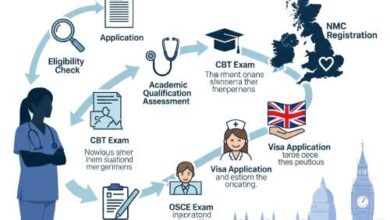Top 5 Common Mistakes Nurses Make When Applying for a UK License (2025 update) – Avoid These for Success

Applying for a UK nursing license can feel overwhelming, especially for overseas nurses who want to build their careers in the United Kingdom. While the process is straightforward if you follow the Nursing and Midwifery Council (NMC) guidelines, many applicants unintentionally make errors that delay their registration—or worse, lead to rejection. Understanding the common mistakes nurses make when applying for a UK license can save you time, money, and unnecessary stress.

In this guide, we’ll walk you through the top 5 mistakes to avoid during your application process. From missing key documents to misinterpreting exam requirements, each point is based on real challenges that nurses face when navigating the NMC system. Whether you’re applying for the first time or reapplying after a setback, this article will help you stay on track and increase your chances of a smooth approval.
By the end, you’ll know exactly what to prepare, what pitfalls to avoid, and how to position yourself for success as you take the next big step toward becoming a registered nurse in the UK.
Step-by-Step on NMC Revalidation: How to Renew Your UK Nursing License Fast (2025 update)
Common Mistakes Nurses Make When Applying for a UK License
1. Submitting Incomplete or Incorrect Documents
One of the biggest mistakes nurses make when applying for a UK license is not providing the correct set of documents or leaving out essential details. The Nursing and Midwifery Council (NMC) requires very specific paperwork to verify your identity, education, and nursing qualifications. Even a small error—such as a name mismatch between your passport and degree certificate—can lead to unnecessary delays.
Common document errors include:
-
Uploading expired passports or identification cards.
-
Providing transcripts that are not officially sealed or certified.
-
Missing verification from your home country’s nursing council.
-
Submitting documents in the wrong format (uncertified photocopies instead of official copies).
These mistakes often result in your application being flagged for review, which means you’ll need to re-submit or request new documents from your institution—a process that can add months to your timeline.
How to Avoid It:
-
Double-check the NMC requirements list before uploading anything.
-
Ensure all documents are up to date, translated (if not in English), and officially certified.
-
Confirm that your personal details (name, date of birth, address) match exactly across all paperwork.
-
Use the NMC Online portal checklist to track uploaded documents and spot errors early.
By taking the time to carefully review your application before submission, you’ll reduce the risk of rejection and move one step closer to securing your UK nursing license.
2. Misunderstanding the IELTS/OET Language Requirement
Another common mistake nurses make when applying for a UK license is underestimating or misunderstanding the English language proficiency requirement.

The NMC requires all overseas applicants to prove they can communicate safely and effectively in English, which usually means passing either the IELTS (Academic) or OET (Nursing) test with the minimum scores accepted.
Many nurses assume their previous education in English is enough, or they think a lower test score will still be accepted. Unfortunately, this leads to rejections or requests for retesting, causing long delays.
Typical errors include:
-
Taking the wrong version of IELTS (General Training instead of Academic).
-
Not achieving the minimum score (e.g., 7.0 in writing for IELTS or a Grade B in OET).
-
Believing scores from more than two years ago are still valid.
-
Failing to combine scores correctly when using the NMC’s “score clubbing” policy.
How to Avoid It:
-
Register for the correct exam: IELTS Academic or OET Nursing only.
-
Carefully review the NMC English language requirements before booking your test.
-
Use official practice materials to prepare, and consider a short preparation course if you struggle with writing or speaking.
-
Submit results as soon as possible to avoid expiration of your test scores.
Meeting the language requirement is one of the most critical steps in your application. Without it, you cannot progress further in the licensing process—so it’s worth investing the time and effort to get it right the first time.
Ultimate Guide: IELTS vs OET for UK Nursing 2025 – Which Test Should You Take(Mastery)?
3. Delaying the CBT & OSCE Exams
A major mistake nurses make when applying for a UK license is postponing their NMC exams—the Computer-Based Test (CBT) and the Objective Structured Clinical Examination (OSCE). These assessments are designed to evaluate your theoretical knowledge and practical nursing skills, ensuring you can deliver safe, effective care in the UK.

Many nurses delay booking their exams because of fear, poor preparation, or simply underestimating how long the process takes. Unfortunately, this can lead to missed deadlines, expired eligibility windows, and added expenses for rebooking.
Common exam-related mistakes include:
-
Waiting too long to book the CBT after eligibility is granted.
-
Underpreparing for the OSCE, which is hands-on and highly structured.
-
Assuming prior nursing experience alone will be enough to pass.
-
Not familiarizing themselves with the exam format, leading to unnecessary stress on test day.
How to Avoid It:
-
Schedule your CBT as soon as you receive authorization—delays only extend your registration timeline.
-
Use official NMC resources and sample papers to prepare effectively.
-
If possible, join OSCE preparation courses or practice sessions to build confidence.
-
Treat the exams as essential milestones, not optional steps—they directly determine your licensing success.
By approaching the CBT and OSCE strategically and without delay, you can stay on track and complete the UK licensing process much faster.
4. Ignoring CPD & Revalidation Requirements
Many nurses focus only on passing the exams and getting their initial UK license, but a big mistake is not preparing early for CPD (Continuing Professional Development) and revalidation requirements.

The Nursing and Midwifery Council (NMC) requires every nurse to renew their registration every three years through revalidation, which involves evidence of learning, reflection, and professional development.
Some nurses wrongly assume revalidation is a simple formality, only to realize later that they haven’t kept the right records or completed enough CPD hours. This can put their license at risk of lapsing, which means they would no longer be able to practice legally in the UK.
Common revalidation mistakes include:
-
Not tracking CPD hours throughout the year.
-
Failing to document reflective practice or feedback from colleagues.
-
Waiting until the last minute to prepare for renewal.
-
Misunderstanding the 450 practice hours requirement within the 3-year cycle.
How to Avoid It:
-
From day one of registration, keep a record of your CPD activities, feedback, and reflections.
-
Familiarize yourself with the NMC revalidation guidelines early.
-
Use digital tools or apps to log practice hours and CPD points automatically.
-
Set reminders well before your renewal date to avoid last-minute stress.
By planning ahead and staying consistent, revalidation becomes a smooth process rather than a stressful hurdle. Ignoring this step is one of the most avoidable mistakes nurses make when applying for and maintaining their UK license.
5. Overlooking Fees & Financial Planning
The UK nursing license process involves several steps, and with each comes an associated cost—from language tests to exams, document verification, and application fees. One of the biggest mistakes nurses make is failing to plan financially for the entire journey.

This often leads to unexpected delays when they realize they can’t afford the next stage.
Typical financial mistakes include:
-
Budgeting only for the NMC application fee, but forgetting the costs of IELTS/OET, CBT, OSCE, and verification documents.
-
Not accounting for travel and accommodation expenses for the OSCE, which must be taken in the UK.
-
Overlooking revalidation costs every three years.
-
Relying on last-minute loans or borrowing, which creates unnecessary financial pressure.
How to Avoid It:
-
Before starting your application, create a comprehensive budget that covers all expected fees from start to finish.
-
Include additional expenses like exam resits, notarizations, or courier services.
-
If moving to the UK, prepare funds for initial relocation, housing, and living expenses.
-
Consider employer sponsorship or recruitment agencies that may cover parts of the process.
By planning your finances in advance, you eliminate surprises, reduce stress, and ensure that money doesn’t become a barrier to your nursing career in the UK.
Conclusion: Avoid These Mistakes and Fast-Track Your UK Nursing License
Applying for a UK nursing license is one of the most rewarding steps in your career, but it can also be stressful if you fall into common traps. From incomplete documentation and language test delays to postponing CBT/OSCE exams, ignoring revalidation requirements, and overlooking financial planning, each mistake can slow down or even derail your registration journey.
The good news is that all these challenges are avoidable with the right preparation. By staying organized, budgeting wisely, and following NMC guidelines closely, you’ll not only save time and money but also secure your place in the UK healthcare system faster.
Remember, the UK offers excellent opportunities for nurses—from competitive salaries to career growth and global recognition. Don’t let preventable mistakes hold you back from achieving your dream.
Stay ahead by exploring our detailed guides on NMC revalidation, IELTS/OET preparation, and UK nursing job opportunities. Following a structured plan will make your application smoother and boost your chances of success.
Reliable External Resources
-
Nursing and Midwifery Council (NMC) – Official Guidance
👉 https://www.nmc.org.uk/registration/joining-the-register/register-nurse-midwife/trained-outside-uk/
(Official step-by-step guide for overseas nurses applying to the UK register.) -
UK Visas and Immigration – Skilled Worker Visa Guidance
👉 https://www.gov.uk/skilled-worker-visa
(Covers visa requirements for nurses moving to the UK for work.) -
NMC – Revalidation Requirements
👉 https://www.nmc.org.uk/revalidation/
(Essential resource for nurses to avoid mistakes in ongoing registration renewal.) -
CBT & OSCE Exam Information – NMC Test of Competence
👉https://www.nmc.org.uk/registration/joining-the-register/toc/
(Official details on the CBT and OSCE exams for international nurses.) -
Royal College of Nursing (RCN) – International Nurses Hub
👉 https://www.rcn.org.uk/international
(Practical advice and professional guidance for overseas nurses entering the UK workforce.) -
UK Council for International Student Affairs (UKCISA) – Immigration Guidance
👉 https://www.ukcisa.org.uk/
(Helpful for nurses who need immigration/visa support while applying.) -
World Health Organization (WHO) – Global Nursing Workforce
👉 https://www.who.int/campaigns/world-health-day/2020/nursing-and-midwifery
(Provides context about international nursing demand and opportunities.)
FAQs: Common Questions About Applying for a UK Nursing License
To apply for a UK nursing license, overseas nurses must register with the Nursing and Midwifery Council (NMC). The process includes submitting verified documents, proving English language proficiency (IELTS or OET), passing the Computer-Based Test (CBT) in your home country, and completing the OSCE exam in the UK. Once you pass all stages and meet the character and health checks, you can join the NMC register and legally work as a nurse in the UK.
The top mistakes include:
Submitting incomplete or inconsistent documentation.
Underestimating the time and preparation required for IELTS/OET.
Delaying CBT or OSCE exams, which can extend the timeline.
Ignoring CPD and revalidation requirements after initial registration.
Failing to plan financially for all the fees and hidden costs.
Avoiding these mistakes ensures your application moves forward smoothly.
The timeline varies depending on preparation, document verification, and exam availability. On average, the process takes 6 to 12 months. Nurses who prepare early for IELTS/OET and book CBT and OSCE exams without delay often finish faster. Delays usually occur when candidates underestimate preparation time or fail to submit complete documents.
The cost depends on several factors, but nurses can expect to spend between £1,500 to £3,000 (excluding relocation). Key fees include:
NMC application fee – £140
CBT – £83
OSCE – £794 to £1,000
IELTS/OET – £180–£400 (depending on location)
Document verification (CGFNS or NMC-approved agencies) – varies by country
Budgeting properly will help you avoid unexpected financial stress.
If you fail, you are allowed to resit the exam, but you must pay the fee again. The NMC permits up to three OSCE attempts. Failing three times means you must wait six months before reapplying. This is why early preparation, practice, and review are crucial to avoid extra costs and delays.
Yes. Unless you trained in a country where English is the first language and your nursing education was taught and examined in English, you must prove proficiency through IELTS or OET. The NMC requires:
IELTS: Minimum 7.0 in listening, reading, and speaking, and 6.5 in writing.
OET: Grade B in listening, reading, and speaking, and C+ in writing.
Every three years, nurses must renew their registration through revalidation. This involves:
450 practice hours (or 900 for dual registration).
35 hours of CPD (20 hours must be participatory).
Five pieces of practice-related feedback.
Five written reflective accounts.
Confirmation from an NMC-registered professional.
Failure to meet these requirements can result in losing your license.
To avoid delays:
Gather and verify all documents before applying.
Start preparing for IELTS/OET as early as possible.
Book CBT and OSCE exams in advance.
Keep a record of all CPD activities for revalidation.
Budget for fees and possible resits.
Planning ahead ensures a smoother, faster path to registration.



